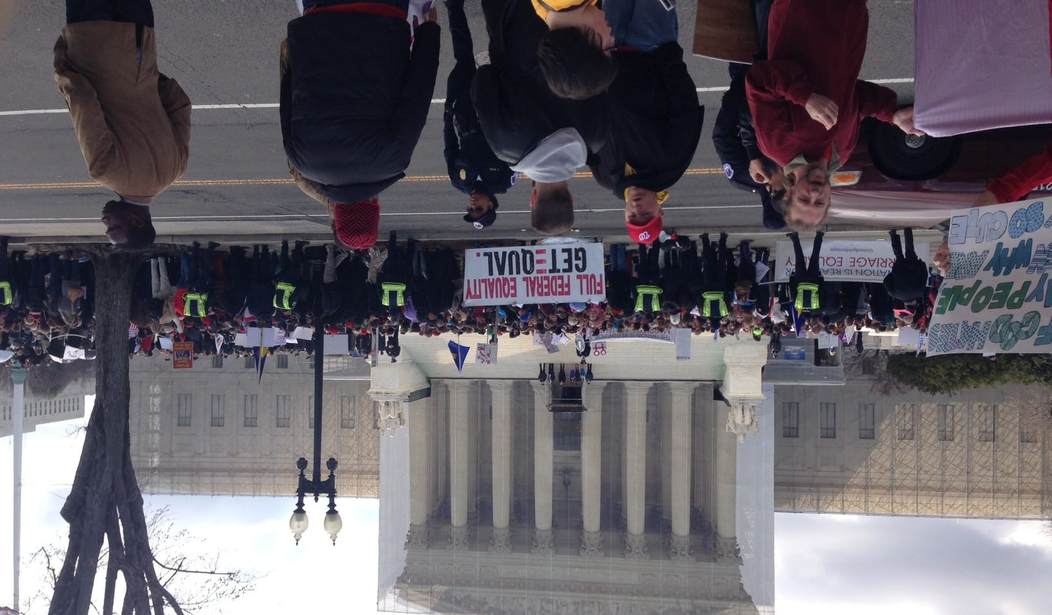WASHINGTON – Throngs of protesters gathered on the steps of the U.S. Supreme Court, while the U.S. justices heard oral arguments Tuesday in a challenge to California’s Proposition 8 – the ballot initiative passed in 2008 that prohibits same-sex marriage.
Thousands of people representing diverse views on same-sex marriage rallied outside of the Supreme Court. Police were there to keep things under control in case anything happened between the separate rallies. But the heavy police presence seemed an unnecessary precaution, as the vast majority of the people there were in support of the repeal of Proposition 8.
Most of the groups in favor of Proposition 8 held a counter-rally on the National Mall.
“I’m proud today to represent the District of Columbia which along with nine states did not wait for the Supreme Court to do the right thing and simply pass a marriage equality law,” said Eleanor Holmes Norton (D), the District’s delegate to the U.S. Congress. “This is one nation indivisible and the court must recognize all. There are no second-class citizens in America and there are no second-class marriages in America.”
Currently, nine states and Washington, D.C., permit same-sex marriage. Eight other states allow civil unions or domestic partnerships that offer all state marriage benefits.
The rally had an eclectic lineup of speakers, all using the opportunity to voice their support for marriage equality, including many political activists, representatives from civil rights organizations, and ordinary people sharing their stories on why the U.S. should recognize same-sex marriage.
Many of the people in attendance came prepared with signs, banners and chants that they would sing in unison in between speeches. Priests, lawyers, journalists, and drag queens provided a colorful and, for the most part, friendly atmosphere for the thousands assembled in front of the Supreme Court.
“I believe that everyone has the right to make their husband as miserable as I do,” read one poster held by a woman, while her husband stood next to her with a big grin on his face. Another interracial couple held a sign that said, “Not long ago our marriage was illegal. Be on the right side of history. Marriage equality for all.”
David Frum, a Republican strategist and commentator, was one of the few conservatives speaking at the rally. Frum, who was one of the more than 130 Republicans and conservatives that signed the amicus brief in favor of equal marriage rights, told the crowd that the freedom to pursue happiness is coming true in their time.
“There are many issues that are the property of no one party. For a conservative, the remarkable thing about the movement for same-sex marriage is that it is a civil rights movement that is less about claiming rights than it is about accepting responsibilities,” said Frum. “No agency of government can do for anyone what loving spouses do for each other.”
Shortly after the first speaker took the stage, a faint sound of bagpipes could be heard in the background. A few minutes later a procession from the National Mall rally, led by kilted bagpipers and people holding large American flags and banners, cut across those gathered outside the Supreme Court.
The rally, officially called “The March for Marriage,” passed in front of the Supreme Court before making its way down Constitution Avenue toward the National Mall. At one point, there was a loud exchange of chants between the two groups, which ended after those marching made their way past the rally in favor of marriage equality.
Some of those participating in the counter-rally stayed behind and held their signs quietly while some people would occasionally notice them and begin a debate on the issue.
Susan Bly of West Virginia, one of the few people from the counter-rally that stayed behind, said that she hopes that the Supreme Court upholds Proposition 8 because she believes that marriage should only be between a man and a woman.
“Once you start a downward slope you have to think about polygamy and marriage between close relatives…you have to take a stand somewhere and say this is as far as it goes,” said Bly. “If you were to support gay marriage then you have to support other types of marriages as well.”
Inside the court, the justices questioned the meaning of marriage and the government’s role in defining it. They also discussed whether the ability to procreate was relevant to the legal definition of marriage.
Justice Anthony Kennedy, seen as a swing vote between the four liberal and four conservative justices, suggested that children of same-sex marriages would suffer an “immediate legal injury” under the ban.
“There are some 40,000 children in California, according to the Red [State] Brief, that live with same-sex parents, and they want their parents to have full recognition and full status,” said Kennedy.
But Kennedy also said the court is being asked to head “into unchartered waters” because they have “only five years of information to pose against 2,000 years of history.”
The justices may be eager to dismiss the appeal on jurisdictional grounds to avoid any sweeping ruling on the issue.
Kennedy raised concerns about whether the possible legalization of same-sex marriage was enough to establish that those in favor of the ban could suffer harm. If no harm can be proven, it would allow the justices to dismiss the appeal without any ruling at all.
“I just wondered if the case was property granted,” said Kennedy.
If the court dismisses the appeal, it may mean lower federal court rulings declaring Proposition 8 unconstitutional would stand in California.










Join the conversation as a VIP Member